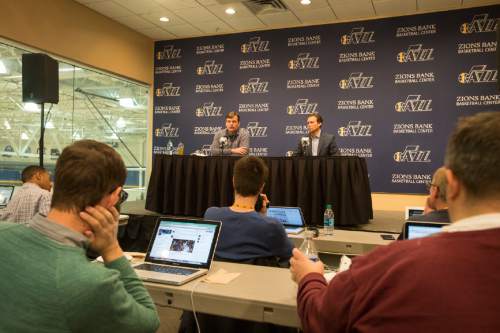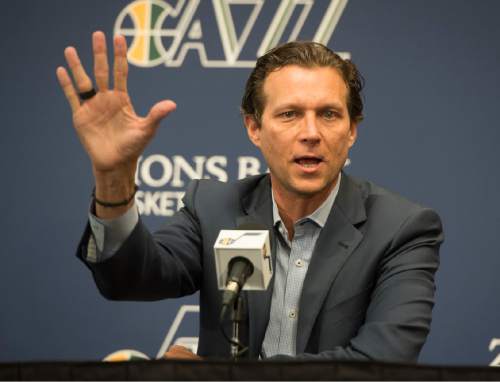This is an archived article that was published on sltrib.com in 2016, and information in the article may be outdated. It is provided only for personal research purposes and may not be reprinted.
Interviews are always interesting with Jazz coach Quin Snyder, who endorses his players with marketing zeal of a business student and supports his team's performance with courtroom-style evidence as a Duke law school graduate.
In a recent discussion about the Jazz's troubling late-season fade, Snyder cited a series of overtime games and other close losses in defense of his team's 40-42 record. My counter-argument: That's more of an indictment than anything else.
Always armed with information of his own, general manager Dennis Lindsey pointed out how the Jazz's season metrics projected 46 wins, based on scoring differential. So should that be reassuring, or just more frustrating?
I'm going with maddening. Instead of conducting exit interviews above an empty practice court Thursday, the Jazz should have been preparing for a playoff series with Golden State, San Antonio or Oklahoma City.
Every team in every sport, including the 73-9 Warriors, can talk about games that got away. But not quite as much as the 2015-16 Jazz. This is a stunning statistic: The Jazz were involved in 26 games — nearly one-third of the schedule — when the teams were separated by one point in the final minute. They won only nine of them, with a better winning percentage than only Phoenix and Philadelphia.
"We had opportunities," Gordon Hayward said, "and I think that's all you can ask for."
Well, other than decent results. Hayward did say he needs to spend the summer focusing on making open shots, undoubtedly referencing his 0-for-8 effort from 3-point range in Monday's crippling loss to Dallas.
Coaching, composure, confidence and competitiveness play into the difference between winning and losing, and all of those areas have to improve.
The close losses are "something you can't help but internalize as a coach," Snyder said. "We'll go back and look at every game and see where we can be better."
Snyder deserves highly favorable reviews for his overall work in two seasons, with a staff that succeeds in developing players. But the judgment of him has to include late-game strategy — and outcomes, even if the failures are not always the fault of coaching.
Part of Lindsey's solution is playing fewer close games and blowing out more opponents. Actually, the Jazz posted 30 wins by nine or more points. So they simply have to get better at the end of games.
Rodney Hood can't just take the would-be winning shot against San Antonio, he has to make it. And he can't go 1 for 11 against Dallas. Even so, he's proud that he kept attempting big shots, after a memorable miss against Golden State in November.
Derrick Favors can't just be in position to grab the clinching rebound against the Los Angeles Clippers, he has to take it away from Cole Aldrich. Missing the playoffs is "definitely heartbreaking," Favors said, but the Jazz "learned what it takes."
The lack of finishing power is "something that we have to hundred-percent own and get better on," Lindsey said. "Frankly, I'm very confident that we'll resolve those."
Prior to Monday's game vs. Dallas, Snyder observed, "I know I say this probably too much, but we literally are the youngest team in the league and we have the least amount of NBA experience in the league."
I agree; he says it too much. It's also true that the Jazz have to get older. They need another Derek Fisher. I mean, somebody like Fisher, a 10-year veteran who helped take the Jazz from 41 wins in 2005-06 to 51 wins and the Western Conference finals the following season.
Leadership is a big part of this issue, as Snyder said Thursday. Whether via a trade or using some of their $28 million under the salary cap, the Jazz need upgrades that translate to better performance late in games. Lindsey's biggest revelation Thursday was that he thought he had made two trades that never were finalized.
Saying he tried to do something is shrewd strategy, of course, in a market that demanded more of this team. Higher expectations are healthy. In multiple ways, the Jazz failed to finish in 2015-16. They have to do better next season, right from the start.
Twitter: @tribkurt





